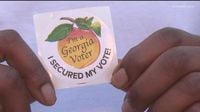Georgia’s voter rolls have just undergone one of the largest purges in U.S. history, with more than 478,000 names removed in a sweeping effort to maintain what state officials call the “cleanest” voter lists in the nation. The move, which unfolded over the summer and culminated this week, has sparked a fierce debate over election integrity, voter rights, and the real-world impact on thousands of eligible Georgians—many of whom only learned of their status thanks to grassroots outreach, not official notifications.
For Alfreda Monroe, a retired grandmother from Hinesville, the issue hit home when she discovered she was among those slated for cancellation. Monroe hadn’t voted since Barack Obama’s first presidential run in 2008, but she never imagined that would lead to her losing the right to vote altogether. “If I choose not to vote that year, then I choose not to vote. I should have that option,” Monroe told Capital B Atlanta. She only found out about her impending removal after a call from the voting rights group Fair Fight, prompting her to re-register in person at her local elections office.
The story is not unique. According to state records and Fair Fight’s outreach, Monroe was one of nearly half a million Georgians who received notices from Secretary of State Brad Raffensperger’s office since July 10, 2025, warning that their voter registrations would be canceled unless they responded to the mailing or updated their information online or in person. The state’s “voter list maintenance” process, officials say, is designed to remove people who have moved away, died, been convicted of a felony, or simply not voted for more than five years and two general election cycles.
But the numbers—and who they affect—have drawn scrutiny. Fair Fight’s analysis found that Black Georgians, who make up about 31% of the state’s registered voters, accounted for more than 44% of those on the cancellation list when excluding people who voted in other states in 2022 and 2024. White voters, by contrast, make up roughly half the state’s electorate but only 35% of those at risk of removal. “There’s definitely a disparity there,” said Janetta Cureton, Fair Fight’s voter protection director, emphasizing the disproportionate impact on Black voters.
The Secretary of State’s office maintains that the process is both routine and essential. “Clean voter rolls mean clean elections. My promise to Georgia voters is elections that are free, fair and fast — and we’re doing just that,” Raffensperger said, as quoted by the Atlanta Journal-Constitution (AJC). Blake Evans, Elections Director for the Secretary of State, echoed this sentiment, noting that inflated rolls can “unnecessarily cause extra expenses.” According to Evans, the audit began in July, with notices sent to voters who had not participated in elections for nearly a decade. Only about 1% responded; “the other ninety-nine percent, we received no response from them, so that percentage will go to canceled status,” Evans told local media.
The breakdown of the purge is revealing: over 180,000 had moved out of state, more than 87,000 filed address changes with the U.S. Postal Service, 105,000 had no contact with election offices in five years, and 104,000 had undeliverable mail. Yet, as the AJC found, about one in five Georgians removed from the rolls between 2017 and 2023 re-registered, with more than half still living in the same county. This churn, as University of Georgia political scientist Trey Hood put it, is a constant: “There’s constantly people that are getting added to the rolls. There’s constantly people that are getting subtracted from the rolls.”
For voters like Cordell Williams of Stonecrest, the process feels anything but routine. Williams, who last voted in 2020, learned from Fair Fight—not the state—that his registration was inactive. “Y’all have done more as far as contacting me than [state election officials] have done as far as a mailing system,” Williams told Capital B Atlanta. “As long as I pay taxes and I get up and I work every day, when and when I do not vote shouldn’t be a determination whether I can be a citizen of Georgia or not. That’s my right.”
State officials insist that no active voter is being hindered by the process and that anyone affected has “multiple options to make sure they can remain in active status,” according to a spokesperson for the Secretary of State. Gabe Sterling, the office’s chief operating officer, urged voters to check and update their information on the My Voter Page before the August 20 deadline: “At that point, you’ll have had a new contact with us and you’ll get moved back to active [status]. That way, you will remain on Georgia’s voter registration rolls.”
Still, critics argue the system is imperfect and can sweep up eligible voters who simply haven’t participated in recent elections. “Just because you elect not to vote should not be a reason to remove you from the rolls. It should be based on the idea that you moved, not that you decided to sit an election out,” said Julie Houk, an attorney for the Lawyers’ Committee for Civil Rights Under Law. Georgia’s “use it or lose it” law, which cancels registrations after two missed general elections, accounted for nearly 106,000 of the cancellations—about 22% of the total, according to AJC data.
The debate has drawn voices from across the political spectrum. Fair Fight CEO Lauren Groh-Wargo called the cancellations “voter suppression by administrative process,” especially given the disproportionate effect on Black voters and younger adults—voters aged 30-44 are twice as likely as other age groups to appear on the cancellation list, making up 44% of those scheduled for removal. Conservative groups, however, contend the cleanup is overdue and necessary to prevent fraud. “This voter roll cleanup is not only common sense, it’s long overdue,” said Terry Fye of Greater Georgia, a conservative voter mobilization organization. “Election officials, and especially the secretary of state’s office, are legally required to keep our rolls accurate, and failing to do so undermines trust in our elections and opens the door to potential fraud.”
Meanwhile, election officials themselves have been preparing. From August 10 to 13, more than 600 officials and staff from all 159 Georgia counties gathered at the Savannah Convention Center for their annual training conference. Blake Evans described the event as vital for ensuring that elections are conducted fairly and securely, with sessions covering everything from legal compliance to best practices for voter engagement. “Everyone…wants the general public to realize that the work of Voter Registration/Election officials, directors, and staff is daily and year-long, not just during an election cycle,” reported The Savannah Tribune.
For those removed from the rolls, hope is not lost: they can still re-register and participate in this fall’s municipal and public service commission elections, provided they act by early October. The state has urged all Georgians to check their status on the My Voter Page and to take action if needed. As the dust settles on this historic purge, the challenge remains to balance the integrity of the process with the fundamental right to vote—a balancing act that will no doubt shape Georgia’s political landscape for years to come.



